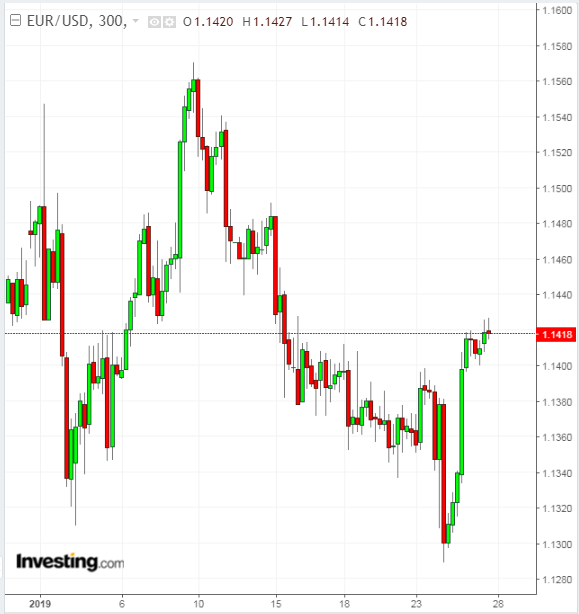Actions speak louder than words and the recent misses in central bank forward guidance might make investors yearn for the days when central bankers said nothing, or cloaked their comments in relatively subtle code. Their intentions became clear only when they actually did something.
Like U.S. Federal Reserve chair Jerome Powell before them, last week, European Central Bank President Mario Draghi and Bank of Japan Governor Haruhiko Kuroda found themselves walking back previous guidance.
“The risks surrounding the euro area growth outlook have moved to the downside,” Draghi said at the press conference following the ECB governing council meeting Thursday, “on account of the persistence of uncertainties related to geopolitical factors and the threat of protectionism, vulnerabilities in emerging markets and financial market volatility.”
In a whatever-it-takes remark, he said the governing council “stands ready to adjust all of its instruments” as needed, to boost inflation toward its 2-percent target.
Draghi said the markets had gotten the data-contingent part of its forward guidance right, showing that they no longer expect a rate hike this year, but rather, in 2020 at the earliest. The ECB president thus acknowledged he would likely be the first head of the central bank to go without a rate hike in his eight-year term, which expires at the end of October.

Markets seemed to agree with Draghi because the reaction to his abandoning the idea that risks were balanced was subdued, with the euro coming back from initial declines.
With interest-rate hikes off the table, analysts expect the ECB to use targeted long-term refinancing operations (TLTROs)—direct loans to banks at favorable rates—as the tool to ease monetary conditions, rather than go back to buying bonds. The TLTROs were discussed at last week’s meeting, but there was no decision about deploying them, Draghi said.
The Bank of Japan fulfilled market expectations by doing nothing, but analysts are noticing that the central bank is falling far short of its quantitative easing target even as it routinely pays lip service to the goal of buying JPY 80 trillion in government bonds a year. One calculation has it that the BoJ is on pace to buy only JPY 20 trillion this fiscal year, ending March 31, after JPY 38 trillion last year.
The central bank lowered its core inflation forecast for the year to 0.9 percent from 1.4 percent, further away than ever from its 2-percent goal and prompting its renewed commitment to the symbolic JPY 80 trillion in bond purchases. The downward revision was attributed to a decline in oil prices. Governor Kuroda counseled patience—they will get to their 2 percent eventually.
Later in the week, at Davos, Kuroda warned that slowing long-term growth and an aging population will make life harder not only for the Bank of Japan but for central banks in general as they are already at or near the zero lower bound and have virtually no room to maneuver.
After Fed Chair Powell sharply moderated his tone in the new year from his hawkish remarks following the December monetary policy meeting, analysts are now speculating the Fed will slow down its efforts to wind down assets accumulated during its years of quantitative easing and perhaps end up with a much higher permanent level than originally anticipated.
It seems the world is not yet ready for the ‘normalization’ central bankers hanker for. Policymakers, judging by Kuroda’s comments in Davos, are clearly bothered that some new crisis may be on the horizon and they will have limited means to cope with it.
But that's tomorrow’s problem. Rather than bemoan the tendency of pesky facts to get in the way of their normalization, central bank policymakers might do better to focus on the persistent failure of prices to rise and therefore to tilt toward deflation.
Stephen Moore, an economic adviser to President Donald Trump, urged the Fed—and the central bankers who follow its lead—to do just that in a column last week for CNN. He contends that the sharp drop not only in oil prices but in commodity prices across the board herald further declines in inflation after U.S. CPI declined 0.1% in December.
In any case, Moore says, there is no evidence of the economy overheating. Rather, as Draghi’s remarks indicate, it is slowing down. Central banks are, belatedly, putting the brakes on their tightening of monetary policy, which now seems to have been premature. The question is whether that will be enough.
